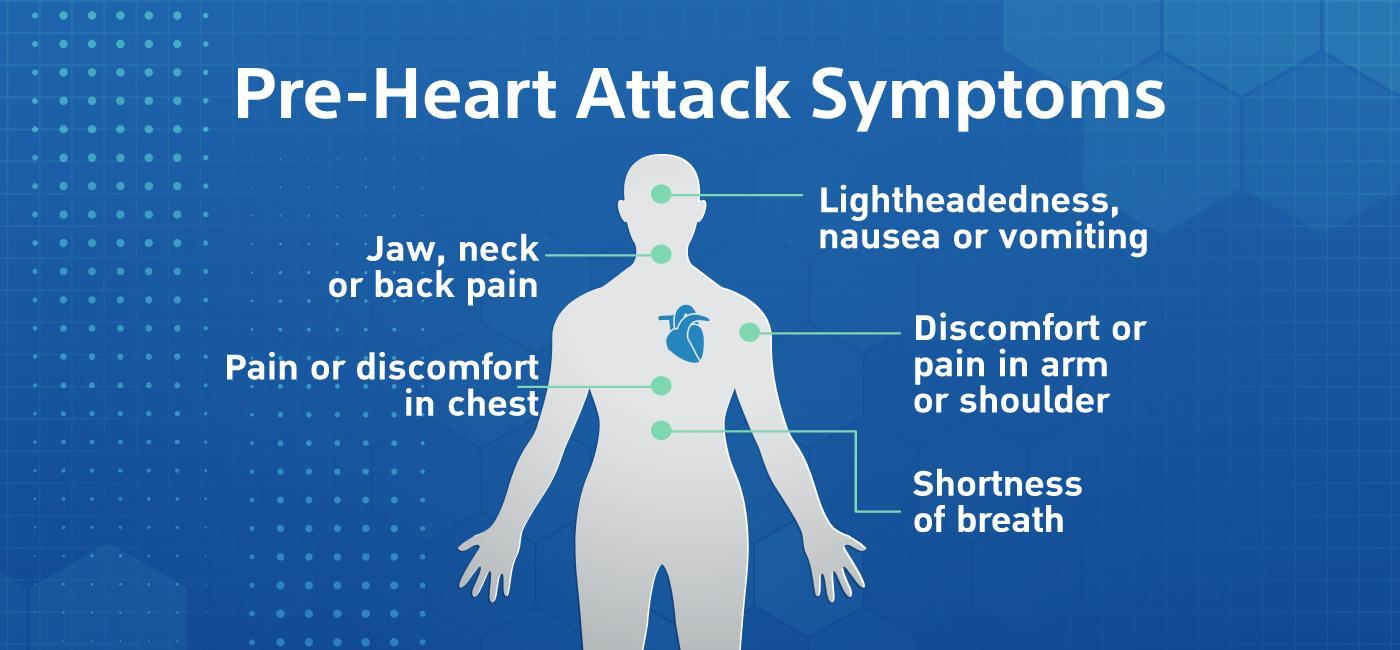Heart disease is a leading cause of death worldwide, including in India. It occurs when the heart is blocked, causing damage to the heart muscle. This can lead to serious complications or even death. Understanding the warning signs of a heart attack and what happens during one can help you take the necessary steps to prevent or treat it.
Pre Heart Attack Symptoms

Heart attacks can occur suddenly or develop over time. In some cases, they can be preceded by warning signs or symptoms that indicate that a heart attack is imminent. Here are some of the most common pre-heart attack symptoms to look out for:
Chest pain or discomfort: This is the most common heart attack symptom. It leads to pressure, tightness, squeezing, or burning in the chest.
Shortness of breath: Feeling breathless or unable to catch your breath is another warning sign of a heart attack. This may occur with or without chest pain.
Nausea or vomiting: Feeling sick to your stomach may indicate a heart attack.
Sweating: You may suddenly break out in a cold sweat, even if you're not doing anything strenuous.
Fatigue: Feeling overly tired or exhausted, especially for no apparent reason, may be a symptom of a heart attack.
Dizziness or light-headedness: Feeling faint or dizzy can be a warning sign of a heart attack.
Chronic Pain in body parts: Pain or discomfort in the arms, neck, jaw, back, or stomach can also be a symptom of a heart attack.
If you experience these pre-heart attack symptoms, seek medical attention immediately. It's important to remember that not everyone shares the same symptoms, and some people may not have any symptoms at all.
What Happens During a Heart Attack?
During a heart attack, the blood flow to the heart is blocked, usually by a blood clot. This can cause damage to the heart muscle and lead to several complications. Here is what happens during a heart attack:
Blockage: A heart attack occurs when one or more of the coronary arteries, which supply blood to the heart, get blocked. It happens due to the buildup of plaque, a blood clot, or a combination of both.
Damage to the heart muscle: When the blood flow to the heart is blocked, the heart muscle begins to die. The longer the blockage remains, the more damage is done to the heart muscle.
Complications: A heart attack can lead to several complications, including heart failure, abnormal heart rhythms, or sudden cardiac arrest.
Treatment: Treatment for a heart attack depends on the severity of the blockage and the amount of damage done to the heart muscle. Medications may sometimes dissolve the blood clot or prevent further clotting. In more severe cases, surgery may be necessary to restore blood flow to the heart.
Preventing a Heart Attack
Preventing a heart attack involves making lifestyle changes that reduce your risk of developing heart disease. Here are tips to help you reduce your risk:
1. Quit smoking: Smoking is a significant risk factor for heart disease. Quitting smoking can significantly reduce your risk of developing heart disease.
2. Eat a healthy diet: A diet rich in fruits, vegetables, whole grains, lean protein, and healthy fats can help reduce your risk of heart disease.
3. Regular exercise helps you maintain a healthy weight, reduce stress, and improve your health.
4. Manage stress: Chronic stress leads to the development of heart disease. Managing stress, such as through meditation or yoga, is essential to help reduce your risk.
5. Control your blood pressure: High blood pressure is a significant risk factor for heart disease. Monitoring your blood pressure regularly and taking steps to keep it under control can help reduce your risk.

6. Control your cholesterol levels: High cholesterol levels can contribute to plaque buildup in the arteries, increasing your risk of heart disease. Eating a healthy diet and taking medications prescribed can help keep your cholesterol levels in check.
7. Manage diabetes: People with diabetes are at a higher risk of developing heart disease. Managing your blood sugar levels through diet, exercise, and medication can help reduce your risk.
Knowing the warning signs of a heart attack and what happens during one can help you take the necessary steps to prevent or treat it. If you experience any pre-heart attack symptoms, seek medical attention immediately. Making lifestyle changes that reduce your risk of developing heart disease can help prevent a heart attack. Remember to quit smoking, eat a healthy diet, exercise regularly, manage stress, control your blood pressure and cholesterol levels, and
manage diabetes if you have it. Caring for heart health is essential to living long and healthy lives.
To learn more about Heart Attack, its symptoms and prevention, visit: https://bit.ly/3jNvJH8
